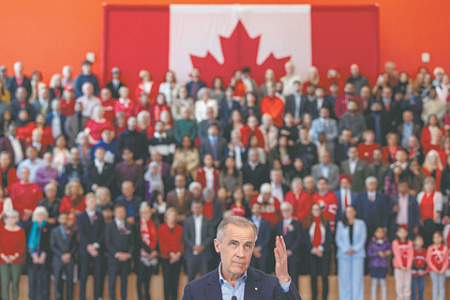
Early parliamentary elections are scheduled for Monday, April 28, in Canada. According to polls, the Liberal Party led by Mark Carney is the favorite. The Liberals, who until recently seemed to have hopelessly disappointed Canadians with their unsuccessful economic policies, managed to raise their rating by actively opposing US President Donald Trump. Whether this resource will be enough to win will be determined at the polling stations.
The vote was overshadowed by a crime that shocked the whole country. On Saturday, April 26, in Vancouver, a car drove into the crowd of the Filipino national holiday. At least nine people were killed. The driver was detained. His motives are unknown. At the time of signing the number, the police said only that there was no reason to classify the bloody incident in Vancouver as a terrorist attack. Campaigners expressed their condolences to the victims, and Carney even temporarily interrupted his campaign events.
Some observers expressed concerns that the events in Vancouver would reduce the expected high turnout for the elections: people might allegedly be afraid to come to the polling stations. Even if these fears are justified, there will still be a lot of voters. By April 27, 7.3 million voters had voted early. The total population of Canada is approximately 40 million people.
The “Trump factor” is expected to have a major impact on turnout. The tariff war with the neighbor and his threats to deprive Canada of independence will push voters to the polls to support those forces that oppose the US president. Actually, Trump is criticized by all Canadian parties. However, the main opposition force, the Conservatives, are traditionally closer to the values of the Republican Party of the USA. The leader of the Conservative Party, Pierre Pouillevre, tried to distance himself from Trump as best he could. But, probably, the voters did not appreciate it.
Polls show that the liberals have a slight advantage of 4-5%, and they have a good chance of gaining a majority in parliament. Six months ago, such a result seemed incredible. Prime Minister Justin Trudeau was extremely unpopular. At the beginning of the year, the Conservatives had an advantage over his party of almost 20%. The main intrigue of the current elections was not even the question of who would win (it seemed obvious that the Conservatives would get the most votes), but whether they would be able to get the necessary majority to form a government without having to form coalitions.
However, the American elections suddenly intervened. Trump not only won them, but began an unexpected turn in policy towards Canada. Against the background of the confrontation between the two countries, the liberals decided to change the leadership. Trudeau had to resign and call elections for the head of the party, which Carney won. And there is a chance for liberals. Many Canadians now realized that the head of the Liberal Party was not the author of numerous government mistakes, but the former head of the Bank of Canada and the Bank of England. That is, the one who helped Canada survive the 2008-2009 financial crisis relatively easily. In addition, he had nothing to do with the Trudeau cabinet, like, for example, former Finance Minister Chrystia Freeland. She was considered Carney’s main opponent in the internal party elections. The disadvantages of the new liberal leader included his low recognition. During his election campaign, Carney heroically tried to rectify the situation, which, judging by the polls, he basically succeeded.
He is exploiting the image of a new politician who will not only successfully defend the country’s independence, but will also be able to turn the page on the government’s failures. Carney is being elected to parliament for the first time, while his main opponent, Pouillevre, has been sitting in the legislature for a long time. It will be known in the near future whether the political experience will play a positive role in the eyes of the Canadian voter. It is not customary to delay the counting of votes in Canada.
